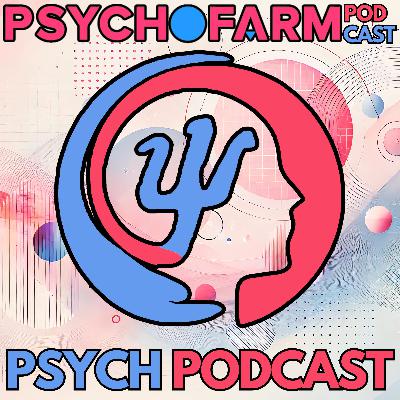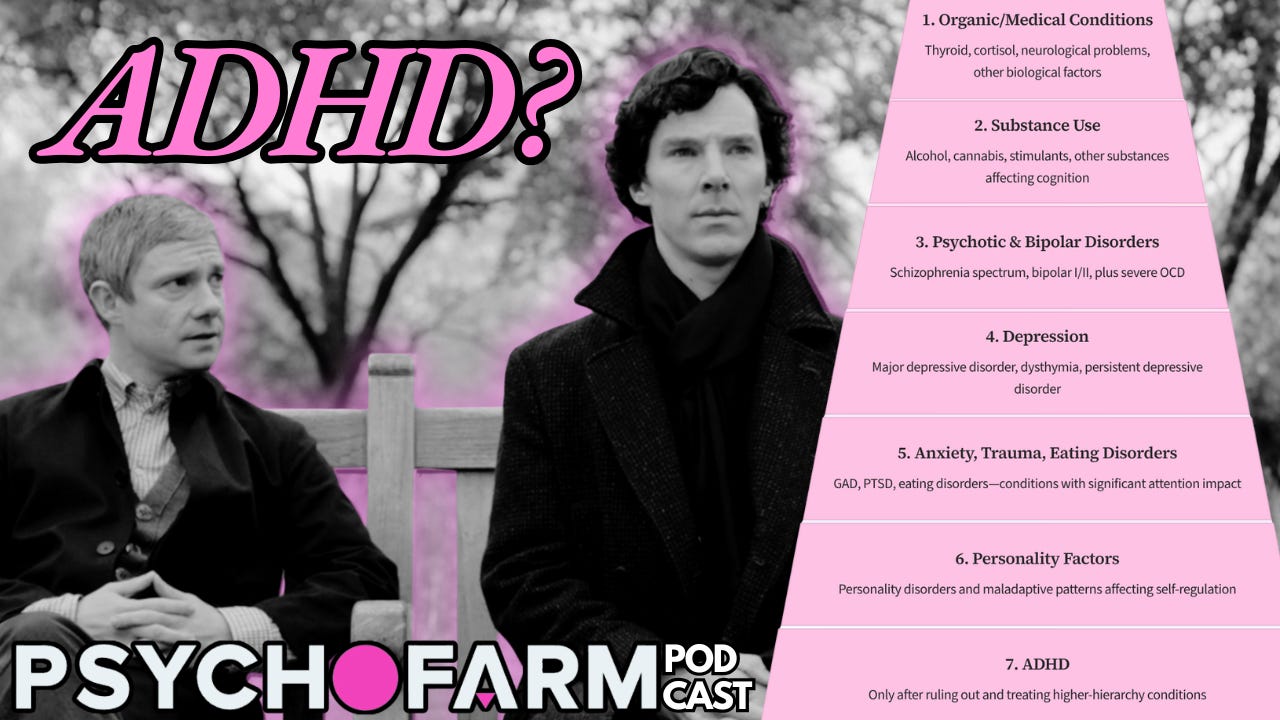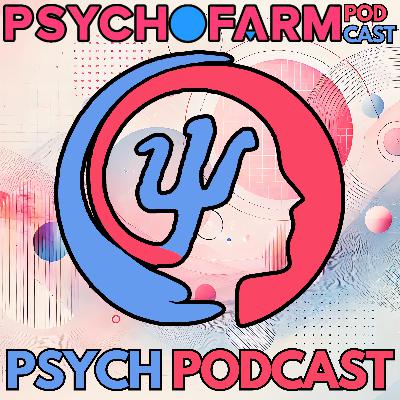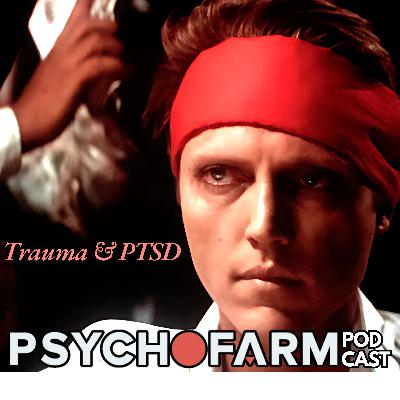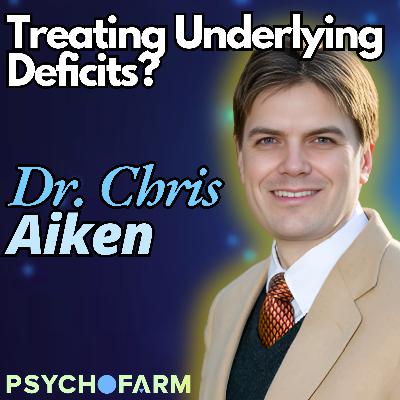Discover Psychofarm Podcast
Psychofarm Podcast

Psychofarm Podcast
Author: Psychiatry, Skepticism, and Integration.
Subscribed: 34Played: 346Subscribe
Share
© Psychofarm
Description
PsychoFarm Podcast is a deep dive into the intersection of psychiatry, psychopharmacology, and the evolving understanding of mental health. Hosted by 2 psychiatrists, the podcast explores complex topics such as diagnosing mood and personality disorders, the role of medications in treatment, and the challenges of psychiatric training. Each episode breaks down the clinical insights and philosophical debates surrounding mental health care, providing both practitioners and curious listeners with thoughtful analysis, expert opinions, and practical advice.
psychofarm.substack.com
psychofarm.substack.com
36 Episodes
Reverse
Dr. Catherine Eubanks, PhD joins us to unpack the therapeutic alliance in everyday practice: how to spot withdrawal and confrontation ruptures, why Bordin’s goals–tasks–bond still predicts outcomes, and how metacommunication jump starts repair. We translate research into concrete moves you can use in brief psychiatric visits, psychotherapy, and supervision. We discuss telehealth, boundaries, and measuring ruptures with the 3RS system. Clinicians, trainees, and curious listeners will leave with a clearer lens and usable language for repair that strengthens trust and improves care across settings.Upcoming WorkshopAlliance Rupture Repair with Dr. J. Christopher Muran & Dr. Catherine EubanksWhen: Thursday, November 13 (1:00–4:00 PM EST)Where: Virtual via ZoomCost: $60 CE | $50 General | Students 50% off (code: STU)CEs: APA for psychologists; NYSED for LCAT, LCSW, and clinical psychologistsDescription:A 3-hour transtheoretical workshop on recognizing and repairing alliance ruptures. Includes didactics, video analysis, and skills training to improve repair strategies and strengthen therapeutic effectiveness.Register: https://www.eventbrite.com/e/alliance-rupture-repair-3-ces-tickets-1797546502979?aff=oddtdtcreatorRecommended Books & VideosTherapist Performance Under Pressure: Negotiating Emotion, Difference, and Ruptureby Catherine Eubanks & J. Christopher Muranhttps://www.apa.org/pubs/books/therapist-performance-under-pressureRupture and Repair in Psychotherapy: A Critical Process for Changeedited by J. Christopher Muran, Catherine Eubanks, & Lisa Wallner Samstaghttps://www.apa.org/pubs/books/rupture-repair-psychotherapyVideo: Rupture and Repair in Psychotherapyhttps://www.apa.org/pubs/videos/rupture-repair-psychotherapyAlliance-Focused Training: An Evidence-Based Guide to Negotiating Ruptures in Therapyby J. Christopher Muran, Catherine Eubanks, Lisa Wallner Samstag, & James Macdonaldhttps://www.apa.org/pubs/books/alliance-focused-trainingaVideo: Using Alliance-Focused Traininghttps://www.apa.org/pubs/videos/using-alliance-focused-training This is a public episode. If you would like to discuss this with other subscribers or get access to bonus episodes, visit psychofarm.substack.com
Why does it feel like everyone thinks they have ADHD lately? In this episode, two psychiatrists discuss the differential of ADHD. They explore how social media trends (like viral TikTok videos) are fueling ADHD self-diagnosis, and they emphasize the importance of careful evaluation. You’ll learn how to think through whether it’s ADHD vs. look-alike conditions such as depression, anxiety, trauma, OCD, sleep deprivation, or even just chronic stress and burnout. The doctors also talk about the burnout mental health providers are facing with so many people seeking ADHD meds, and they share their balanced approach to diagnosing and treating attention issues in an evidence-based way. This is a public episode. If you would like to discuss this with other subscribers or get access to bonus episodes, visit psychofarm.substack.com
Is psychoanalysis still relevant in modern psychiatry and medication management? We unpack psychodynamic therapy, DSM-5 personality disorders, object relations, ego psychology, splitting, projective identification, attachment theory, and how solid psychiatric formulation improves outcomes in even medication management. This is a public episode. If you would like to discuss this with other subscribers or get access to bonus episodes, visit psychofarm.substack.com
In this episode, we dive into the complexities of the therapeutic alliance and the real challenges psychiatrists face in everyday practice. From patients insisting on ADHD diagnoses and stimulant prescriptions to those requesting Xanax, disability paperwork, or resisting involuntary admission, we role play common clinical encounters and discuss practical strategies for navigating them. Drawing on concepts like collaboration and alliance, we highlight tools for psychiatrists, therapists, and clinicians to manage difficult conversations without burning out. This is a public episode. If you would like to discuss this with other subscribers or get access to bonus episodes, visit psychofarm.substack.com
In this episode we break down how to run a focused, humane, and evidence informed psychiatric intake. We start with setting the frame and role clarity, then show how to use a free narrative to map life course symptoms before moving into targeted history, DSM-5 criteria, and the mental status exam. Along the way we tackle common requests for ADHD or autism evaluations, the risks of checklist thinking, and when to pivot to structured tools. We close with communicating impressions, treatment planning, and next steps. This is a public episode. If you would like to discuss this with other subscribers or get access to bonus episodes, visit psychofarm.substack.com
Boundaries aren’t just rules in psychiatry… they’re part of the treatment itself. In this episode, we explore therapeutic ruptures, transference and countertransference, and how clear treatment frames protect patients, clinicians, and the therapeutic process. From handling “doorknob comments” to navigating burnout, we highlight the practical ways psychiatrists and therapists can use boundaries to strengthen care and reduce resentment. This is a public episode. If you would like to discuss this with other subscribers or get access to bonus episodes, visit psychofarm.substack.com
In this episode, we examine the complex phenomenon of erotic transference in psychiatric care and the critical role of maintaining ethical boundaries. Using the therapeutic frame as our guide, we unpack how patients may develop romantic or sexual feelings toward their psychiatrist… especially during medication management… and why strong boundaries and reality testing are essential to safeguard the treatment process. Drawing on clinical experience and ethical principles, this episode offers clinicians strategies for addressing counter-transference, reinforcing the therapeutic alliance, and knowing when referral or supervision is necessary to protect both patient welfare and professional integrity. This is a public episode. If you would like to discuss this with other subscribers or get access to bonus episodes, visit psychofarm.substack.com
In this fast‑paced Psychopharm podcast, we break down the OCD medication algorithm for obsessive compulsive disorder. You will hear about pushing SSRI doses, switching to Luvox or clomipramine, adding low‑dose antipsychotics, and glutamate modulators such as N‑acetylcysteine and ondansetron. The conversation also demystifies BrainsWay H7 deep TMS, explains realistic expectations for symptom reduction, and stresses that exposure response prevention remains the centerpiece of care. Helpful for psychiatrists, NPs and trainees who want clinical pearls without the fluff.NAC: https://drive.google.com/file/d/1b7ZBeFDKAAwLhfzUo0Jv58jEL7B70l5r/view This is a public episode. If you would like to discuss this with other subscribers or get access to bonus episodes, visit psychofarm.substack.com
In the pilot episode of You Tell Me, the hosts dive into the controversial question: “What’s the harm in more widespread stimulant use?” They explore Silicon Valley’s productivity culture, stimulant risks, and the ethical dilemma of turning psychiatry into a tool for optimization. From there, the conversation shifts into a lighter segment on the stereotypes of medical specialties. The episode ends with a candid discussion on trauma, codependency, and why inpatient psychiatry often misses the mark.This off-the-cuff episode blends unfiltered opinions with occasional psychiatric insights… approachable for clinicians, medical students, or anyone curious about the culture of modern psychiatry. This is a public episode. If you would like to discuss this with other subscribers or get access to bonus episodes, visit psychofarm.substack.com
Join us in this podcast episode focused on Obsessive Compulsive Disorder, where we explore the DSM‑5 criteria, differentiate OCD vs generalized anxiety, and discuss the neurobiological roots of compulsive behavior. We cover practical guidance on exposure response prevention (ERP), using the Yale‑Brown Obsessive Compulsive Scale as a screener, and outline medication strategies like high‑dose SSRIs to support psychological treatment. Ideal for clinicians and anyone seeking to understand or treat OCD effectively. This is a public episode. If you would like to discuss this with other subscribers or get access to bonus episodes, visit psychofarm.substack.com
We unpack the anxiety medication algorithm, moving from first-line SSRI picks like Sertraline and Escitalopram to augmentation with buspirone, gabapentin and lavender. CBT, mindfulness and evidence-based psychopharmacology weave throughout the podcast, so clinicians prescribe appropriately and with the right psychoeducation. This is a public episode. If you would like to discuss this with other subscribers or get access to bonus episodes, visit psychofarm.substack.com
In this episode, we explore anxiety not as a disease in itself, but as a critical signal from your mind and body. We discuss how this signal can point to deeper issues like hidden emotions or relational trauma, and why common diagnoses like GAD (Generalized Anxiety Disorder) often miss the true source of the problem. We also cover the fundamental brain science of fear, the key differences between anxiety, panic, and worry, and introduce five different treatment models designed to help you find and resolve the root cause. This is a public episode. If you would like to discuss this with other subscribers or get access to bonus episodes, visit psychofarm.substack.com
This episode looks at the practical assessment of personality. We explore the nuances of psychiatric diagnosis, moving beyond simplistic heuristics with a focus on the DSM-5's Alternative Model for Personality Disorders. Learn about assessing self-functioning (identity, self-direction) and interpersonal functioning, using clinical interviewing, psychosocial history, and even your countertransference as vital tools for a more comprehensive understanding of personality pathology in busy clinical settings. This is a public episode. If you would like to discuss this with other subscribers or get access to bonus episodes, visit psychofarm.substack.com
This episode delves into Good Psychiatric Management (GPM), a practical framework developed by John Gunderson for treating Borderline Personality Disorder (BPD), though its principles offer broad utility across diagnoses. The hosts discuss the importance of integration, managing expectations (both patient and provider), and robust psychoeducation regarding BPD's features, heritability, and treatment course. Key GPM tenets are explored, including focusing on life outside therapy (work/relationships), the adjunctive role of medication, fostering accountability, and the significance of the therapeutic relationship itself as part of the treatment. This is a public episode. If you would like to discuss this with other subscribers or get access to bonus episodes, visit psychofarm.substack.com
Dive deep into the practicalities of psychiatric medication management for PTSD in this clinical discussion. We explore the often limited evidence base and the necessity of off-label prescribing, focusing on strategies for stabilization, safety, and trust… the first stage of trauma treatment. Learn about experience-based approaches using SSRIs like sertraline, sleep aids such as trazodone and gabapentin, the cautious use of antipsychotics, and why benzodiazepines are discouraged. The conversation also touches on managing sleep disturbances and dissociation, situating medication as a supportive tool alongside essential psychotherapy and lifestyle changes, guided by principles like Pierre Janet's three-stage model. This is a public episode. If you would like to discuss this with other subscribers or get access to bonus episodes, visit psychofarm.substack.com
Join us for an in-depth exploration of trauma and Post-Traumatic Stress Disorder (PTSD). This episode moves beyond common language to establish a clinical definition of trauma, detailing the DSM-5 criteria required for a PTSD diagnosis. The hosts break down the core PTSD symptom clusters – intrusion, avoidance, negative alterations in cognitions/mood, and arousal/reactivity – providing clear examples like flashbacks, hypervigilance, and negative self-beliefs. They delve into the concept of dissociation, its role in trauma, and the challenges it presents in assessment. Listeners will gain crucial insights into the diagnostic process, common misdiagnoses (like mistaking PTSD for depression), the vital importance of earning therapeutic trust, and effective interviewing techniques for sensitive topics, ultimately highlighting why accurate identification is key to recovery. This is a public episode. If you would like to discuss this with other subscribers or get access to bonus episodes, visit psychofarm.substack.com
This conversation explores key aspects of forensic psychiatry, including the insanity defense, dissimulating patients, and how clinical practice intersects with legal systems. It highlights the importance of open-ended dialogue, nuanced diagnosis, and maintaining empathy without succumbing to cynicism. This is a public episode. If you would like to discuss this with other subscribers or get access to bonus episodes, visit psychofarm.substack.com
Join us in a conversation about involuntary commitment, and the legal framework behind psychiatric treatment. We discuss real-world scenarios, share insights into how clinicians juggle patient autonomy versus societal protection. Whether you are new to the field or a seasoned professional, this episode offers valuable perspectives on balancing ethical duties, legal obligations, and patient care. This is a public episode. If you would like to discuss this with other subscribers or get access to bonus episodes, visit psychofarm.substack.com
In this episode, we sit down with Dr. Chris Aiken to look at a big question: when do we treat an underlying deficit in psychiatric illness? Focusing on difficult-to-treat depression, our conversation delves into the deficit model and looks at different paradigms, from neuroprotective strategies and lifestyle interventions to the nuanced use of medications like SSRIs, lithium, and thyroid hormones, as well as targeted supplements. Tune in for a thought-provoking discussion that looks at when we approach treating depression by focusing on its underlying causes.http://www.carlatreport.comhttps://chrisaikenmd.com/partners/https://chrisaikenmd.com/supplements This is a public episode. If you would like to discuss this with other subscribers or get access to bonus episodes, visit psychofarm.substack.com
Schizophrenia treatment is complex, and choosing the right antipsychotic can make all the difference. In this episode, we take a deep dive into schizophrenia medications... breaking down the pros and cons of different antipsychotics, metabolic risks, sedation issues, and the challenges of adherence. We discuss how to tailor treatment to individual patients, avoid unnecessary side effects, and improve long-term outcomes. Whether you're a clinician prescribing antipsychotics or someone looking to understand schizophrenia medications better, this discussion offers practical insights and evidence-based strategies for optimizing treatment. This is a public episode. If you would like to discuss this with other subscribers or get access to bonus episodes, visit psychofarm.substack.com


